MAL / MALO – BIEN / BUENO – GRAN / GRANDE

Hola a todos, hoy vamos a hablar sobre la diferencia entre abjetivos y adverbios en Español. MALO: Adjetivo (Bad) MAL: Adverbio (Badly) 1. Masculino: Malo (After the noun) – Mal (Before the noun) * Pablo is a bad friend: – Pablo es un amigo malo. – Pablo es un mal amigo. * Juan is a bad lawyer: – Juan es un abogado malo. – Juan es un mal abogado. 2. Femenino: Mala (Before and after the noun) * Marta is a bad mother: – Marta es una madre mala. – Marta es una mala madre. * Luna is a bad dog sometimes: – Luna es una perra mala a veces. – Luna es una mala perra a veces. BUENO: Adjetivo (Good) 3. Masculino: Bueno (After the noun) – Buen (Before the N.) * Camilo is a good Co-worker: – Camilo es un colega bueno. – Camilo es un buen colega. * Daniel was a good líder: – Daniel fue un líder bueno. – Daniel fue un buen líder. 4. Femenino: Buena (Before and after the noun) * Ruby is a good artist: Ruby es una artista buena. – Ruby es una muy buena artista. * This a good bycicle: – Esta es una bicicleta buena. – Esta es una buena bicicleta. * My car is not working well: Mi carro no está funcionando bien. – Mi carro está funcionando mal. * I don’t sing well: Yo no canto bien. – Yo canto mal. * The food is bad because they don’t cook well: La comida es mala porque ellos cocinan mal. * I didn’t do good in the math exam: Me fue mal en el examen de matemáticas. * How are you? – Not good!, I am sick. 5. BIEN: Adverbio (Well) * My phone is working now: Mi teléfono está funcionando bien ahora. * I did good in the German test: Me fue bien en el examen de Alemán. * How is your mom doing? – She is fine: ¿Cómo está tu mama? –Ella está bien. 6. Great (Before the noun) * You are a GREAT brother: Eres un GRAN hermano. * You’re a great person: Eres una gran persona. 7. Big (After the noun) * Mauricio is a big boy: Mauricio es un niño grande. * Cuanto tu te vuelves Lucia is big for her age: Lucia es grande para su edad. * My dog is too big to be two months old: Mi perro es muy grande para tener dos meses.
Glosario de slangs latinos
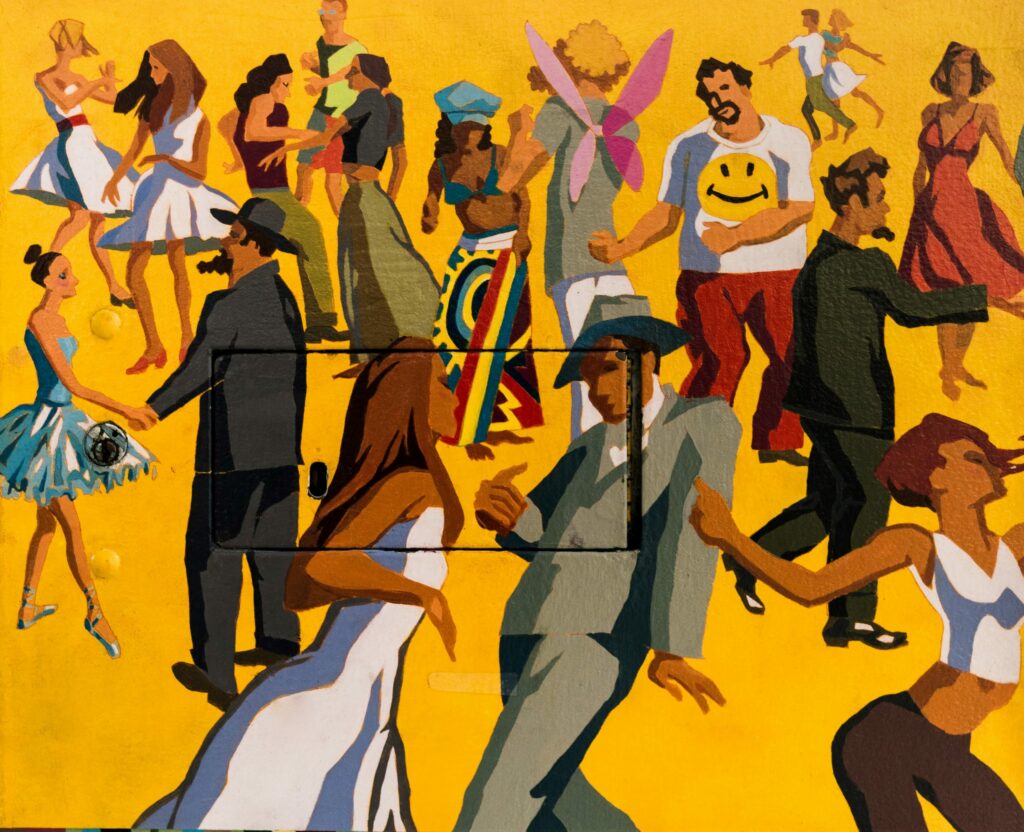
Hola a todos, hoy tenemos un manual de supervivencia para viajar por América Latina. En cada país hay diferentes expresiones lingüísticas aunque todos hablamos Español. Un mexicano, por ejemplo, se expresa diferente a un venezolano y hay muchas palabras que son desconocidas para otros hispanohablantes. Esta es nuestra lista de las mas importantes: Colombia: Parce Significado: amigo. Ejemplo: “Voy a comer con mi parce”. Example: “I’m going to eat with my friend”. Marica Significado: forma más común de dirigirte a un amigo. “Dude”. Ejemplo: “¡Nos vemos en la fiesta, marica!” Example: “See you at the party, dude!” Paila Significado: malo. Ejemplo: “¡Qué día tan paila!” Example: “What a bad day!” Pinta Significado: atractivo. Ejemplo: “Es un man pinta”. Example: “He is an attractive man.” Chévere Significado: cool. Ejemplo: “¡Qué chévere está tu vestido!” Example: “How cool is your dress!” Vaina Significado: cosa / expresión de sorpresa Ejemplo: “¿Qué es esa vaina?” / “¡Qué vaina, ha comenzado a llover!” Example: “What is that thing?” / “What the hell, it’s started to rain!” Mamarracho Significado: alguien con muy mala presentación. Ejemplo: “Tu amigo el mamarracho no podrá entrar a la fiesta”. Example: “Your friend the mamarracho will not be able to enter the party”. México: ¿Qué onda? Significado: ¿Qué tal? / ¿Qué pasa? Ejemplo: “¿Qué onda, cómo te va?” Example: “What’s up, how are you doing?” ¡aguas! Significado: ¡cuidado! Ejemplo: “¡Aguas con el coche!” Example: “Watch out for the car!” Está cañón Significado: que algo está difícil o te ha sorprendido. Ejemplo: “El examen estuvo cañón”. / “¿Viste las noticias? ¡Está cañón!” Example: “The exam was difficult.” / “Did you watch the news? It’s complicated!” Rollo Significado: una situación complicada. Ejemplo: “La pelea fue todo un rollo”. Example: “The fight was complicated.” Neta Significado: verdad. Ejemplo: “La neta, no voy a llegar a tiempo”. Example: “The truth, I will not arrive on time.” Costa Rica Pura vida Significado: todo está bien, no hay problema. Ejemplo: “¿Todo bien? -¡Pura vida!” Example: “Is everything okay? -everything is fine, no problem.” Mae Significado: amigo/amiga. Ejemplo: “Él es mi mejor mae”. Example: “He is my best friend.” Tuanis Significado: agradable, bueno. Ejemplo: “Mi hermana es bien tuanis”. Example: “My sister is very nice.” Jupa Significado: cabeza. Ejemplo: “Cuidado o te golpearás la jupa con esa lámpara”. Example: “Watch out or you’ll hit your head on that lamp.” Jalarse una torta Significado: cometer un error. Ejemplo: “Me jalé una torta en el trabajo y por eso salí tarde”. Example: “I made a mistake at work and that’s why I left late.” Una teja de persona Significado: literalmente, un cien de persona. Una persona muy valiosa Ejemplo: “Ella siempre me ha ayudado, es una teja de persona”. Example: “She has always helped me, she is very valuable.” Perú Canchita/cancha Significado: palomitas de maíz / pop corn Ejemplo: “Compremos cancha antes de entrar al cine”. Example: “Let’s buy pop corn before going to the movies.” Pata Significado: amigo/amiga Ejemplo: “¿A qué hora nos vemos, pata?” Example: “What time do we meet, friend?” Latear Significado: caminar Ejemplo: “Me duelen los pies de tanto latear”. Example: “My feet hurt from walking so much.” Jamear Significado: comer Ejemplo: “¿A qué hora vamos a jamear?” Example: “What time are we going to eat?” Palta Significado: expresión de vergüenza / aguacate Ejemplo: ¡Qué palta con esta situación! / ¡Qué rica está esta palta! (literalmente, aguacate) Example: How embarrassing with this situation! / How delicious is this avocado! (literally, avocado)
¿Saber o conocer?

Hola a todos, hoy vamos a hablar sobre la diferencias entre el verbo saber y conocer ambos con el mismo significado en Ingles To know, estas son las diferencias: Saber 1. Hechos – Facts Nadie sabe dónde esta Pablo. No one knows where Pablo is. ¿Sabías que la estrella más grande en el universo se llama Canis majoris? Did you know that the biggest star in the universe is called Canis majoris? 2. Informacion – Information ¿Sabes a qué hora tendremos la clase el lunes? Do you know at what time we will have the class on Monday? ¿Sabes dónde está la estación de tren? Do you know where the train station is? ¿Sabes quien es el novio de Claudia? Do you know who Claudia’s boyfriend is? 3. Habilidades aprendidas – Learned Skills Pablo sabe tocar el piano. Pablo knows how to play the piano. Ella no sabe leer todavía. She does not know how to read yet. No se como cocinar empanadas pero me gustaría aprender. I don’t know how to cook empanadas but I would like to learn. Usamos SABER en preguntas con estas palabras: ¿Sabes por qué Juan está de mal genio? Do you know why Juan is in a bad mood? ¿Sabes porque la profesora no vino hoy? Do you know why the teacher didn’t come today? ¿Sabías que construirán un nuevo parque? Did you know that they will build a new park? ¿Sabes qué tipo de parque construirán? Do you know what type of park they will build? ¿Sabes cuándo va a llegar Sofia de su viaje? Do you know when Sofia will be back from his trip? ¿Sabes cuál es el apartamento de Ana? Do you know which is Ana’s apartment? ¿Sabes quien esta en la casa de los Ramirez? Do you know who is in the Ramirez house? ¿Sabes porque las tiendas en el centro de la ciudad estan cerradas hoy? Do you know why the shops in the city center are closed today? ¿Sabes dónde está el centro comercial? Do you know where the mall is? Conocer 1. A una persona – A person Ana no conoce a los padres de su novio. Ana hasn’t met her boyfriend’s parents. Conoces a Dermot Kennedy? Do you know Dermot Kennedy? No conoces a mi abuela, ella es una mujer con mucha sabiduria. You don’t know my grandmother, she is a very wise woman. ¿Conoces a Diego? Él es el mejor estudiante. Do you know Diego? He is the best student. 2. Conocerse – To meet ¿Cuándo se conocieron ustedes? When did you guys meet? Mi novia y yo nos conocimos el año pasado. My girlfriend and I met last year. 3. Un lugar – A place ¿Qué países en Latinoamérica conoces? What countries in Latin America have you been to? Solo conozco Brasil y Ecuador. I have only been to Brasil and Ecuador. 4. Una cosa – A thing Yo conozco esta industria, ellos venden moda rapida con materiales de baja calidad y el costo es muy barato. I know this industry, they sell fast fashion with low quality materials and the cost is very cheap. ¿Conoces la fabricadora de carros Tesla? Do you know the car manufacturer Tesla? Yo conozco este ascensor, es muy lento. I know this elevator, it is very slow. No conozco esta marca de jabón, así que no lo compraré. I don’t know this soap’s brand, so I won’t buy it.
Latin American Slangs

Hola a todos, hoy vamos a conocer los slangs mas comunes en Latinoamérica, es importante conocerlos y usarlos para sonar como un nativo. Esta es nuestra selección: 1. Se me hace agua la boca: You say this when something is mouthwatering. (Ves una pizza que se ve deliciosa) entonces dices: ¡Veo esa pizza y se me hace agua la boca! (You see a pizza that looks delicious) so you say: That pizza is mouthwatering! 2. No todo lo que brilla es oro: All that glitters is not gold A: ¡Este chico que recién conocí es muy Bueno! -B: Cuidado, no todo lo que brilla es oro. Conócelo más! A: This guy that I just met is a good guy! -B: Be careful, all that glitters is not gold. Get to know him more! 3. Ser uña y mugre: You say this about two people that are best friends and are together all the time. A: Juan y Ana son uña y mugre. ¡Siempre hacen todo juntos! A: Juan and Ana are best friends. They always do everything together! 4. Aunque la mona se vista de seda, mona se queda: A pig with lipstick is still a pig. A: ¡Él es pobre pero compro un reloj muy caro! -B: Pues, aunque la mona se vista de seda, mona se queda. A: He is poor but he just bought an expensive watch! -B: Well, a pig with lipstick is still a pig. 5.Mejor tarde que nunca: Better late tan never. A: Lo siento por llegar tarde. -B: Bueno pues, mejor tarde que nunca. A: I am sorry to be late. -B: Well, it’s better late tan never. 6.Tomar el pelo: To pull someone’s leg. A: Te ves fea con esa camisa. -B: Enserio? -A: No, estoy tomando el pelo, ¡te ves muy bonita! A: You don’t look good with that shirt. -B: You think so? -A: No, I am pulling your leg, you look very pretty! 7. Es pan comido: It’s a piece of cake. You say this when something is /was very easy. Para mi este examen es pan comido. Yo estudie mucho para esto. For me, this test is a piece of cake. I studied a lot for this. 8. Tirar la casa por la ventana: Spare no expense. ¡Ellos tienen mucho dinero para la boda, van a tirar la casa por la ventana! They have a lot of money for the wedding, they are going to spare no expense. 9. Ir al punto: Get to the point. ¿Puedes dejar de dar vueltas por favor? ¡Ve al punto! Tengo que irme. Can you please quit beating around the Bush? Get to the point! I need to go. 10. La curiosidad mato al gato: Curiosity killed the cat. A: Quiero ir ver que hay detrás de esa montaña. -B: ¡Cuidado, la curiosidad mato al gato! A: I want to go see what is behind that mountain. -B: Be careful, curiosity killed the cat.
Frases Y Palabras De Amor En Español

Hola a todos, hoy traemos frases y palabras de amor para usar a diario, ¿Cuál de estas es tu favorita? 1. Te quiero: This doesn’t mean “I love you” – Make sure you remember that! “Te quiero” really doesn’t have a literal translation in English. It’s neither “I like you” (Me gustas) no “I love you” (te amo). “Te quiero” is what you say at the beginning, when you are starting to have feelings towards another person. 2. Te quiero mucho: Now we add “mucho” just to emphasize that the feelings are now stronger. So, you would say this later in the relationship, when you’ve been together for a longer period of time. 3. Te amo / Te amo mucho / Te amo muchísimo: I love you / I love you so much. 4. Te adoro: I adore you. 5. Me encanta todo el tiempo contigo: I always love being with you. 6. Te amo con todo mi corazón: I love you with all my heart. 7. Tú eres la mejor chica (mujer) del mundo: You are the best girl (woman) in the world. * Tú eres el mejor chico (hombre) del mundo: You are the best guy (man) in the world. 8. Eres todo lo que (yo) quería: You are all that I wanted. *Eres todo lo que (yo) soñé: You are all that I dreamed of. 9. Tú eres la mejor chica (mujer) del mundo: You are the best girl (woman) in the world. *Tú eres el mejor chico (hombre) del mundo: You are the best guy (man) in the world. 10. ¿Te casarías conmigo?: Will you marry me? ¿Quieres ser mi novia?: Do you want to be my girlfriend? *How to tell them you miss them… 11. Quisiera que estuvieras aquí: I wish you were here. 12. Me haces falta / Te extraño mucho: I miss you. / I miss you so much. Palabras Para Expresar Amor (Words Of Endearment): 1. Mi amor / Amor: My love / Love 2. Hermoso(a): Beautiful 3. Princesa: Princess 4. Mi corazón: My heart 5. Mi vida: My life 6. Preciosa: Precious
Expresiones sobre el clima
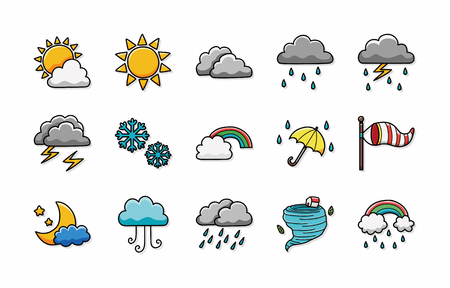
Hola a todos, hoy vamos a hablar sobre el clima y que expresiones podemos usar en Español para responder a las preguntas mas frecuentes sobre los cambios de temperatura. A. ¿Cómo está el clima allá en este momento? Ask this question if you want to know about how the weather is now. Posibles respuestas: Está soleado – It’s sunny Está nublado – It’s cloudy Está lluvioso – It’s rainy Está fresco – It’s fresh outside / It’s cool Está haciendo frío / Hace frío – It’s cold Está haciendo calor / Hace calor – It’s hot Está lloviendo – It’s raining Está lloviznando – It’s drizzling Está nevando – It’s snowing Está cayendo nieve – It’ssnowing Otras expresiones I am hot: Tengo calor Tengo mucho/a calor. I am cold: Tengo frío. B. ¿Cómo es el clima allá en tu ciudad / país? Ask this question if you want to know about how the weather usually is. Posibles respuestas: Es caliente – It’s hot Es frío – It’s cold Es fresco – It’s fresh outside / It’s cool Es templado – It’s fresh / It’s warm Llueve mucho- It rains a lot Casi no llueve- It doesn’t rain much A: ¿Cómo es el clima allá? B: Por lo general es caliente y casi no hay lluvias. Otras preguntas y respuestas importantes: Ha estado… = It has been… A: ¿Cómo ha estado el clima últimamente? Posibles respuestas: Ha estado lloviendo mucho. Ha estado soleado. Ha estado fresco. A: ¿Cómo está el clima? Posibles respuestas: Ahora está soleado, pero últimamente ha estado haciendo frío. Hoy está fresco, pero ayer estaba haciendo mucho calor. Lluvioso. Ha estado lloviendo mucho toda la semana. To talk about the weather in the past use estar in the imperfect: La semana pasada estaba lluvioso, pero ahora está soleado. Ayer estaba lloviendo mucho, pero hoy está soleado / nublado / fresco. Esta mañana estaba haciendo calor, pero ahorita está haciendo frío porque es de noche. El mes pasado estaba lloviendo mucho pero este mes no ha llovido.
17 Formas de despedirse y algo mas

Hola a todos hoy presentamos diferentes formas despedirse y saludarse en Español, en Latinoamérica las usamos todas, estas son las mas populares: Despedidas en español Expresión Uso Equivalente en Ingles Adios Written and spoken Bye Hasta luego Written and spoken Goodbye Hasta pronto Written and spoken See you later Hasta la próxima Written and spoken See you soon Hasta la próxima vez Written and spoken See you the next time Hasta mañana Written and spoken See you tomorrow Que tengas un buen día Written and spoken Have a good day Que te vaya bien Written and spoken Good luck Te veo luego Written and spoken See you later Cuídate Written and spoken Take care Nos vemos Written and spoken See you Que pases un buen día Written and spoken Have a nice day Que descanses Written and spoken Get some rest Nos vemos pronto Written and spoken See you soon Atentamente Written Sincerely Con cariño Written Affectionately Un abrazo Written A hugh from “X” Saludos en español Expresión Uso Equivalente en Ingles Encantado/a de verte Spoken Pleased to meet you Es un gusto verte Spoken I’m glad to see you Buenos días Written and spoken Good day / Good morning Buenas tardes Written and spoken Good afternoon Buenas noches Written and spoken Good evening ¿Como estás? Written and spoken How are you? Es un placer verte Spoken Nice to see you
8 Expresiones que los latinoamericanos usamos para finalizar una discusión
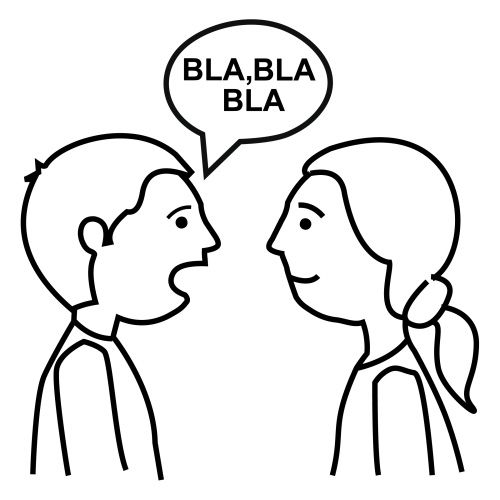
Hola a todos, hoy vamos a aprender expresiones que usamos en Español los latinoamericanos para finalizar una discusión. ¿Cual es tu favorita? 1. Calladito te ves más bonito. You’re beautiful when you don’t talk, or don’t say anything. For example: Le voy a decir a la abuela! – ¡Ssh! Calladita te ves más bonita. I’m going to tell Grandma! – Shh! You’re prettier when you keep your mouth shut. 2. ¡Haz lo que se te pegue la gana! Do whatever you want. For example: Bien, haz lo que quieras con él, no me importa. Well, do what you want with him; I don’t care. Es un país libre, así que haz lo que quieras. It’s a free country, so do whatever you want. 3. Donde manda capitán no manda marinero. Where a captain rules, a sailor has no sway. For example: Tu opinión es muy valiosa pero donde manda capitan no manda marinero. Your opinion is valuable but where a captain rules, a sailor has no sway. 4. ¡Y punto! And that’s that or period. For example: Vamos a comer al restaurante italano y punto. We’re eating at the Italian restaurant and that’s that. Soy joven, es una nueva experiencia para mí, y punto. I’m young, this is a new experience for me, period. 5. Es lo que hay. That’s how things are. For example: No me gusta para nada el nuevo gerente. ¿Qué puedo decir? ¡Es el hijo del director general! Es lo que hay. I don’t like the new manager at all. What can I say? He’s the CEO’s son! That’s how things are! 6. Que pase lo que tenga que pasar. Whatever happend happends. For example: Y luego, que pase lo que tenga que pasar, ¿verdad? And then whatever happens happens, right? Así que, que pase lo que tenga que pasar. So whatever happens, happens. 7. En boca cerrada no entran moscas. Silence is golden. For example: Creo que ya hemos hablado bastante. Como dicen, en boca cerrada no entran moscas. I think we’ve talked enough. Like they say, silence is golden. 8. Más sabe el diablo por viejo que por diablo. With age comes wisdom. For example: Mi abuela siempre dice “Más sabe el diablo por viejo que por diablo”. My grandmother always says “With age comes wisdom”.
12 Palabras que no existen en inglés
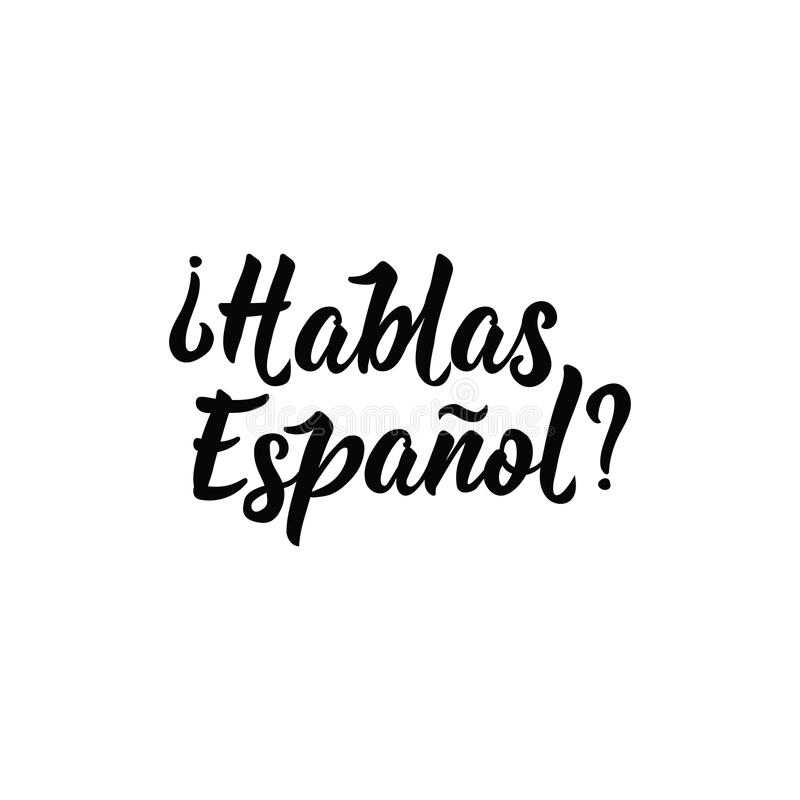
Hola a todos, ¿sabes cuales son las palabras en Español que no tienen traducción? Aquí las tenemos. Trasnochar: In any country in the world there are people who like to sleep late, especially on weekends. However, no verb in English translates literally, the closest thing to trasnochar is to stay up all night. Madrugar: Is the opposite of late night and is another of the words in Spanish that do not exist in English. If you want to specify that you got up before sunrise, you must use the same verb as always, wake up, but you have to add the adverb early. Desvelarse: Close to staying up late, but without falling into excess. It is perhaps the most common action among students, although it is not their favorite. In English, the equivalent of staying awake is under sleep. Anteayer o Antier: Yesterday (yesterday), today (today) and tomorrow (tomorrow) are the words to talk about the closest days in time, but English speakers do not have a single term for when they want to talk about something that happened to them the day before yesterday, but they must say the day before yesterday. Pasado mañana: Case similar to yesterday, but in future days. The phrase used in English for the day after tomorrow is the day after tomorrow. Estrenar: In English this verb has no equivalent for its different meanings. For example, in English the phrase to show for the first time would be used also in Spanish, while if a musical group releases an album, verbs such as launch and release would be used. Pena ajena: It’s when we don’t feel ashamed for what we ourselves did, but for what someone else did. In English it would be used to feel embarrassed by someone. Merienda: This is a case that totally relates to social activities. The snack is located between lunch and dinner, the latter is done at night in many Hispanic countries, the verb is Merendar. An equivalent term is snack or to snack, but one can eat a snack at any time of the day. Empalagar: Have you tried sweets so sugary that they leave you with an uncomfortable sensation on the palate? In Spanish we have the verb empalagar to define this sensation, but in English there is no similar word. From the verb cloying also comes the cloying adjective, also used for insistent people or dating couples who show their love every minute in a cheesy way. Provecho: Is a term of protocol during meals. It is used to wish people you are eating or meeting while eating a pleasant meal. In English the French equivalent is used, bon appetite. Friolento: There is a big difference between being cold at a specific time and being a person with a tendency to always be cold. It is to this last situation that the term chilly refers. Lampiño: In Spanish, the person who has little or no beard, mustache or hair on other parts of the body is said to be hairless. In English you could use hairless, however, this word can also refer to the person who has no hair.
Otras maneras de preguntar: ¿Como estas?
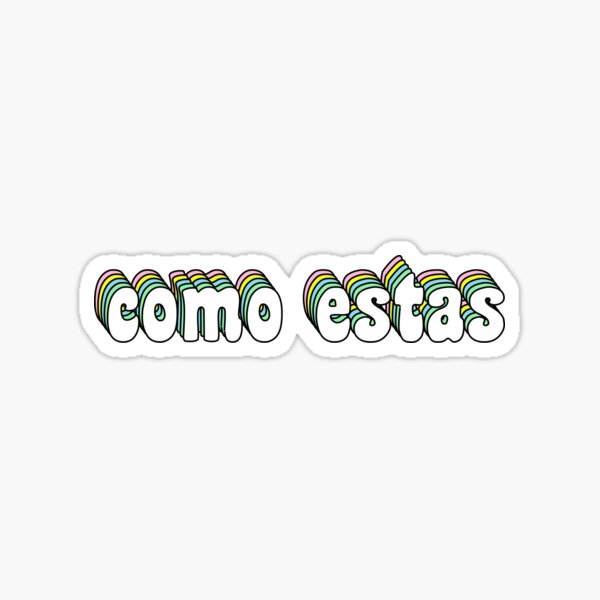
Hola a todos, hoy vamos a aprender otras formas de preguntar por el bienestar de otras personas ¿Reconoces alguna de estas? 1. Hola ¿qué más? Por ejemplo: Hola ¿qué más? Hi, how are you? Bien, trabajando como siempre. Good, working as usual. Hola ¿qué más? Hi, how are you? Bien, he estado en casa, un poco enfermo y cansado. Good, I’ve been home, a little sick and tired. 2. Hola ¿qué me cuentas? Por ejemplo: Hola ¿qué me cuentas? Hi, what’s up? Bien, nada nuevo, todo igual. Well, nothing new, everything the same. Hola ¿qué me cuentas? Hi, what’s up? Bien, trabajando mucho, en mi trabajo tenemos muchos proyectos en los proximos meses. Good, working hard, we have a lot of projects in the next few months. 3. Hola ¿que tal? Por ejemplo: Hola ¿que tal? Hi, how are things? Todo bien, hace mucho sol y por eso voy a pasar el día en la playa con mis amigos. All good, it’s very sunny and that’s why I’m going to spend the day at the beach with my friends. 4. Hola ¿qué hay de nuevo? Por ejemplo: Hola ¿qué hay de nuevo? Hello, what’s up? Muy bien, trabajando y estudiando Español en mis tiempos libres. Very well, working and studying Spanish in my free time. Hola ¿qué hay de nuevo? Hello, what’s up? Muy bien, bueno tuve un excelente fin de semana en un festival con una amiga. Very good, well I had a great weekend at a festival with a friend. 5. Hola ¿cómo va todo? Por ejemplo: Hola ¿cómo va todo? Hello, how is everything? Muy bien, super ocupado, pero bien. Very good, super busy, but good. Hola ¿cómo va todo? Hello, how is everything? Mas o menos, el trabajo ha estado intenso esta semana. So so, the work has been intense this week. 6. Hola ¿cómo has estado? Por ejemplo: Hola ¿cómo has estado? Hello, how have you been? Bien, he estado ocupada con diferentes proyectos. Well, I’ve been busy with different projects. Hola ¿cómo has estado? Hello, how have you been? Mas o menos, no tengo trabajo en este momento. So so, I don’t have a job at the moment. 7. Hola ¿cómo te ha ido? Por ejemplo: Hola ¿cómo te ha ido? Hi, how’s it going? Bien pero estoy pensando en tomarme un tiempo. Good but I’m thinking of taking some time. 8. ¿Cómo te ha ido EN…? Por ejemplo: Hola ¿cómo te ha ido en el nuevo trabajo? Hi, how was your new job? Me ha ido bien, pero he estado ocupado. I’ve been doing well, but I’ve been busy. ¿Hola cómo te ha ido en el trabajo? Hi, how was work? Me ha ido bien, pero he estado muy estresado con todo. I’ve been doing well, but I’ve been very stressed with everything.
